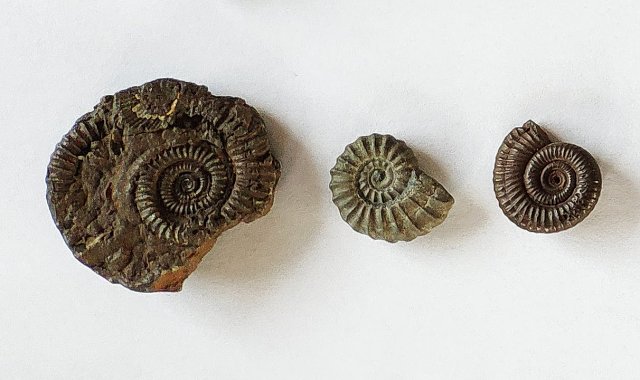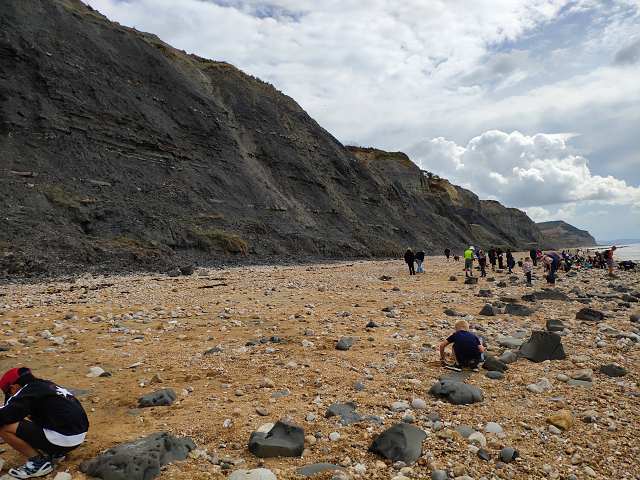映画が公開されたからというわけではないでしょうが、National Geographicにこのような記事が掲載されていました。
The forgotten fossil hunter who transformed Britain’s Jurassic Coast
これが小見出しです。
Mary Anning and her most important dinosaur finds went unsung, but her legacy now draws travelers to southwest England.
見慣れない単語unsungはsingの過去分詞に接頭辞un-が付いているので、そのまま訳すと「歌われていない」となります。Cambridge Dictionaryによると”not noticed or praised for hard work, courage, or great achievements”とあります。「勤勉、勇気や素晴らしい業績が気づかれていない、もしくは称賛されていない」という意味です。かつては英雄や偉人が歌で讃えられたたことに由来するのでしょう。
ですので小見出しは「メアリー・アニングと彼女の最も重要な恐竜の発見は称賛されていないけれども、現在彼女の伝説はイングランド南西部に旅行者を引き寄せている」となります。私も引き寄せらた一人です(詳しくは「古生物学者メアリー・アニングを題材にした映画『Ammonite』」)。
重要な英語表現に絞って記事を見ていきましょう。
If you had lived in Victorian times, you’d have spotted her, perhaps, at the foot of Church Cliff to the east of Lyme Regis, a seaside town on England’s southwest coast. She’d have a wicker basket in one hand, a small geologist’s hammer in the other, and be dressed in a plaid coat and cape made of heavy wool—it is chilly by the shore. Her small dog, Tray, would have been skittering by her side.
What you might not have known then is that Mary Anning was arguably the greatest fossil hunter of them all, “the princess of paleontology,” a contemporary called her. In Victorian England, in an era of amateur scientists, fossil hunters were nearly always men.
前半に使われているIf you had lived in Victorian times, you’d have spotted her…は仮定法過去完了です。過去の事実に反することを述べる際に用いられます。「もしビクトリア朝時代に生きていたら、彼女を見つけたことだろう。」
これは英文法の基本ですが、大学入試の二次試験では後半部のWhat you might not have known then is that Mary Anning was arguably the greatest fossil hunter of them all, “the princess of paleontology,” a contemporary called her.を和訳しなさいというような問題が出ます。和訳のポイントがわかるでしょうか。
whatが関係代名詞というのは大丈夫でしょう。ポイントはmight not have knownです。前半部をしっかり読んでいたら気づくでしょう。これも仮定法過去完了です。ifの省略ですね。”the princess of paleontology”はthe greatest fossil hunterの同格です。直前にあるコンマがイコールを表しています。英語ではよくある表現です。
これらを踏まえて和訳すると「その時あなたが気づいていなかったであろうことは、メアリー・アニングがおそらく最も偉大な化石発掘家であり、同時代の人たちが言うところの「古生物学の女王」だということだ」となります。
映画に関する記述もありました。
Kate Winslet plays Anning in the recent film Ammonite, in which Anning falls into a lesbian relationship with Charlotte Murchison, a geologist. The characters were real; the romance, fiction.
映画でアニングが恋に落ちるCharlotte Murchisonは実在の人物ですが、恋に落ちる部分はフィクションですのでご注意を。
“She sold what she found. Her fossils are credited to the rich man who donated them to museums, rather than the poor woman that found them. It’s not so much about gender as class. Today, she would be running a department at Oxford or Cambridge,” Tucker says.
ここに(他にもですが)報われなかったアニングが書かれてあります。「彼女の化石はそれらを見つけた貧しい女性(アニング)にではなく、むしろ博物館に寄贈した裕福な男性に対して功績が与えられている。」
It’s not so much about gender as class. ここにはnot so much A as Bという構文が使われています。AというよりはむしろBです。なので「それは性別というよりはむしろ階級に関して(のため)である。」という意味です。
Today, she would be running a department at Oxford or Cambridgeはまた仮定法です。runは他動詞です。高校入学後に文型を学習する時に学ぶでしょう。一般的には「~を経営する」と訳しますがここではdepartment「学部」ですので、「今日なら彼女はオックスフォード大学やケンブリッジ大学で学部長を勤めているだろう」くらいです。
“But the real monument is going down to the beach in summer and seeing how many kids are there hunting for fossils,” Keith Moore says.
アニングの功績として多くの子どもたちが化石発掘を楽しむ姿を挙げている人もいます。
記事の最後の方では化石発掘に関しても触れています。
The general public can hunt the beaches at Lyme and Charmouth, the two safest points on the coast, but amateurs are warned to stay away from the cliffs and to beware of tides. And leave your geological hammer at home.
崖からは離れて潮に気をつけましょう。ハンマーも要りません。「古生物学者メアリー・アニングを題材にした映画『Ammonite』」でも書きましたが、この浜辺では化石発掘ではなく化石拾いとなります。また行きたいですね。
この記事が公開されたのは2021年3月29日なので映画公開とは無関係と思っていたのですが、改めて調べてみるとアメリカでは去年の11月公開でしたが、舞台となったイギリスでは3月26日なのでイギリス公開に合わせたようですね。日本も4月9日なのでタイミング的にピッタリですね。





Comments
[…] 【さらに追記】 おそらくイギリスでの公開に合わせてNational Geographicでメアリー・アニングの記事が掲載されました。こちらも当ブログの記事「またメアリー・アニング記事-映画『アンモナイトの目覚め』記念」で紹介しています。 […]